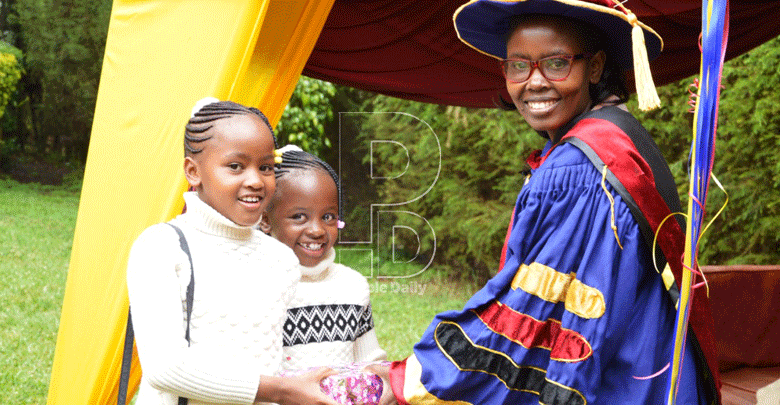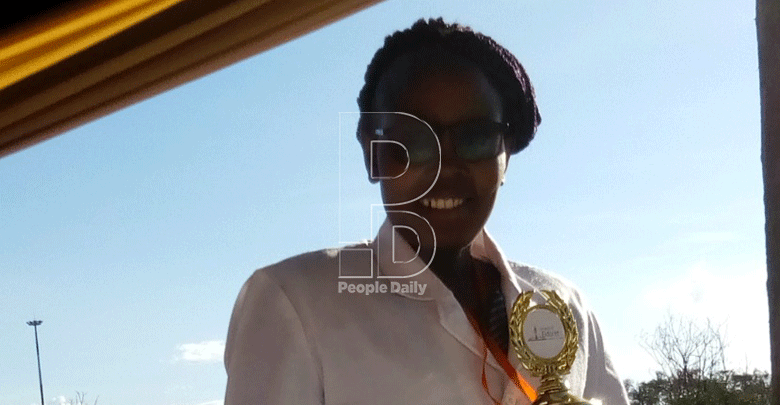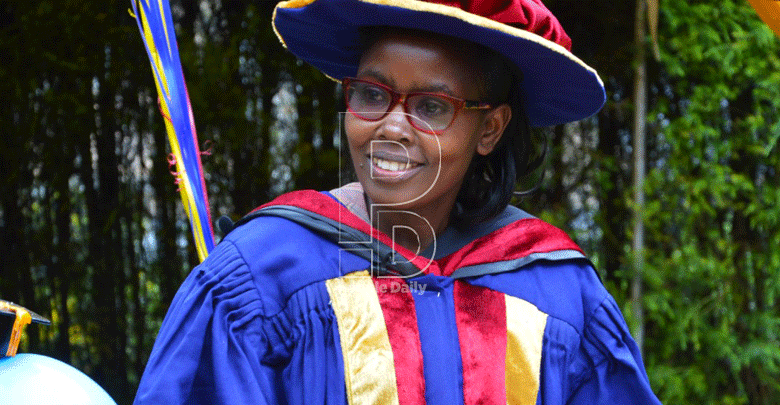I refused to let spine condition define me

Dr Lynnete Moraa Oimbo-Mackambo speaks on rising above spina bifida to achieve academic excellence and embracing motherhood.
A merican best-selling novelist Winston Churchill once said, “Success is not final; it is the courage to continue that counts.”
This saying can well be replicated in the life of Dr Lynnete Moraa Oimbo-Mackambo.
Dr Moraa, 40, currently holds a PhD in Weed Science from the University of Eldoret and works at the same university as a laboratory technician in the School of Environmental Studies.
Despite her title, she remains humble, aware of the bumpy ride she has endured on her way.
“In my life, I have been guided by this principle; nothing should stand in your way to achievement since everything has a solution.
Choose what works for you,” says the doting mother of three children aged 11, nine and 10 months.
Painful childhood
Dr Moraa was born with a congenital condition called spina bifida, (when a baby’s spine and spinal cord does not develop properly in the womb, causing a gap in the spine.)
This posed a challenge in her younger years and she had to endure backpains.

“Growing up was tough for me. I could not do things that even my younger ones could do.
If I were to clean utensils, I could do it while seated. My mother was concerned, but to others, I was just being rude and difficult.
I could sometimes suffer from back pain, which got worse with time. Whichever hospital I visited, I was given pain killers and that was it.
My mum said that at birth I had a small black patch on my back, which kept growing for some time, but later stopped.
At one time it became itchy and septic,” says the fifth born in a family of eight.
When education came first
One of her sisters joined a nursing school and told her parents that what Dr Moraa suffered from could be a serious condition, which needed proper diagnosis and management.
“At that time, I was in Form Three and could not imagine dropping out of school to seek medication because I knew I could not pursue both at the same time due to financial issues.
I pretended I was okay so that I could continue with school, but deep inside, I was suffering,” she recalls.
She started seeking proper treatment in 1999 after her secondary school.“ After a number of x-rays, I was refereed to Kenyatta National Hospital (KNH).
I attended clinics at KNH for three years without anything forthcoming and gave up.

I decided to join college. My mum wept at the idea of I going to college while still sick, but I was adamant,” she explains.
She attended Mawego Technical Training Institute between 2002 and 2004 for a diploma course in Applied Biology and later joined the then Kenya Polytechnic for a Higher Diploma in Applied Biology before joining the University of Eldoret where she got all her three degrees.
Dr Moraa got married in 2008 and fell pregnant in 2009 though doctors had advised her against carrying a pregnancy because of her back pains.
“It was a smooth pregnancy, save for two-weeks bed rest. Since we were not sure of the extent of the spine condition, I opted for an elective caesarian section,” she says.
In April 2015, while already a mother of two children, Dr Moraa learnt of an intended visit by Indian doctors to Eldoret Hospital.
“On the day of the visit, I was the first one in the queue. After examining my medical report, the doctors advised that I needed to undergo surgery in India.
I left the hospital feeling good at heart that though I may not have the said surgery because of lack of money, at least there was hope.
My husband assured me that I would have the surgery, whatever it took,” she says.
The breakthrough
She offers: “On August 5, 2015, we left for Shalby Hospital, India where I was diagnosed with spina bifida.
I had surgery on August 10. The surgery was minimally invasive and took two hours and recovery was fast.
I was no longer in pain, but numb. A test was done on the lesion on my back, but the doctor said it didn’t pose any medical problem and I could just live with it or have it removed.
I chose to live with it. The surgery marked the end of my pain. After 34 years of spina bifida, I’m now on my sixth year of a new me.”
Dr Moraa is grateful for her supportive husband. “Sometimes, when we didn’t have house helps, he could step in.
It was difficult for my children to understand why I had to delegate duties that I could do for myself.
At times, they could insist that it is a mother who should do certain tasks and other times they wanted to be carried around on the back, something I couldn’t do. But with time, they understood my condition,” she adds.
In January 2016, Dr Moraa enrolled for her PhD after her Master’s of Science graduation held in November 2015.
“I felt I had to go further to compensate for the things I couldn’t do. I had to give myself a title. For once, I didn’t have any back pain and I was able to concentrate.
I thank God for my supervisors who were prompt in corrections and were not tired of my many messes.
Though I had to repeat my project three times, they made me see the reasons,” she says.
“I was the only student in my class. In fact, there had been no student in that course since the curriculum was developed by Moi University in 1984.
I, therefore, had no one to learn from, but I was encouraged that at last I could hold a ‘first’.”
Dr Moraa graduated with a PhD in 2019 and according to her, her academic achievement is something she is proud of.
“There is an on-going research I’m doing on a bio-herbicide, but we shall celebrate it when time comes.
If not for the uncertainties brought about by the pandemic, my team and I could have accomplished some of our research objectives,” she says.












